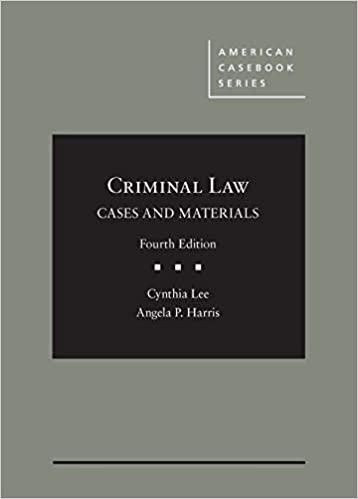Question
In Stong v. Lane, the court put great weight on the fact that the parties' misunderstanding was __________________. a deliberate deception by both parties an
In Stong v. Lane, the court put great weight on the fact that the parties' misunderstanding was __________________.
a deliberate deception by both parties
an honest mistake by both parties
an honest mistake by one party
a deliberate deception by one party
The deal in Stong v. Lane illustrates what can happen when a purported contract has a ______________.
typographical error
patent ambiguity
failure of consideration
latent ambiguity
If the parties in Stong v. Lane had included a formal (e.g., surveyor's metes and bounds) description of the real estate in their agreement, what would likely have been the result?
The case would still have reached the same result--no enforceable contract was formed.
A contract would have been formed as to the formally-described property, but only if the buyer clearly understood what the description meant.
We cannot know the result, because the court provides no clues about what it would have done in such a situation.
A contract would have been formed as to the formally-described property, even if the buyer misunderstood what the description meant
Why was no contract formed in Stong v. Lane?
The parties neglected to put their agreement in writing, which rendered it unenforceable.
The parties failed to reach an agreement in an objective sense.
The parties failed to reach an agreement in a subjective sense.
Neither of the parties believed that he had reached an agreement with the other party.
The Oswald v. Allen court stated that the terms "Swiss Coins" and "Swiss Coin Collection" were ambiguous. What type of ambiguity is the court referring to here?
Patent ambiguity, because the existence of multiple meanings for those terms is clear on their face.
Neither of the other answers is correct, as the court is mistaken with this particular statement.
Latent ambiguity, because the existence of multiple meanings for those terms is not clear unless facts unstated in the parties' agreement are also known.
Did the Oswald v. Allen court find that Dr. Oswald and Mrs. Allen objectively should have known what the other party intended to be the actual coins being sold?
Yes
No
If Sue and Belinda attach materially different meanings to their manifestations of assent to a contract between them, and BOTH of them know what the other actually means, then what happens?
A contract is formed based on Belinda's understanding.
No contract is formed.
A contract is formed based on Sue's understanding.
A contract is formed, but it will be based on neither Sue's nor Belinda's understanding.
Juan and David have entered an agreement. David knows that Juan misunderstands the meaning of a key term. Juan, in contrast, reasonably believes that he and David attribute the same meaning to that key term in the contract. What is the result?
No contract is formed because the rule contained in section 20 of the Restatement (Second) of Contracts prevents formation in situations like this one.
No contract is formed because misunderstanding inherently prevents the necessary "meeting of the minds" for contract formation.
A contract is formed based on David's understanding of the key term.
A contract is formed based on Juan's understanding of the key term.
Zehmer claimed that at the time Lucy made his offer to purchase the Ferguson Farm for $50,000, Zehmer thought Lucy was joking. Why was this belief on Zehmer's part not enough to prevent the formation of a contract?
Zehmer's belief was wholly irrational and thus is afforded no legal weight.
An objective observer witnessing the event would have thought, as Lucy did, that the offer to sell the Ferguson Farm was a genuine offer.
Subjectively, both parties believed that the offer to sell the Ferguson Farm was a genuine offer.
The joke was not very funny.
According to the Lucy v. Zehmer court, how intoxicated would Zehmer have had to have been in order to be able to void the real estate contract based on his own lack of capacity?
Zehmer would have to be unable to walk a straight line.
Zehmer would have to be "high as a Georgia pine."
Zehmer would have to be unable to drive himself home.
Zehmer would have to be unable to comprehend the nature and consequences of the instrument he invalidated.
Step by Step Solution
There are 3 Steps involved in it
Step: 1

Get Instant Access to Expert-Tailored Solutions
See step-by-step solutions with expert insights and AI powered tools for academic success
Step: 2

Step: 3

Ace Your Homework with AI
Get the answers you need in no time with our AI-driven, step-by-step assistance
Get Started


